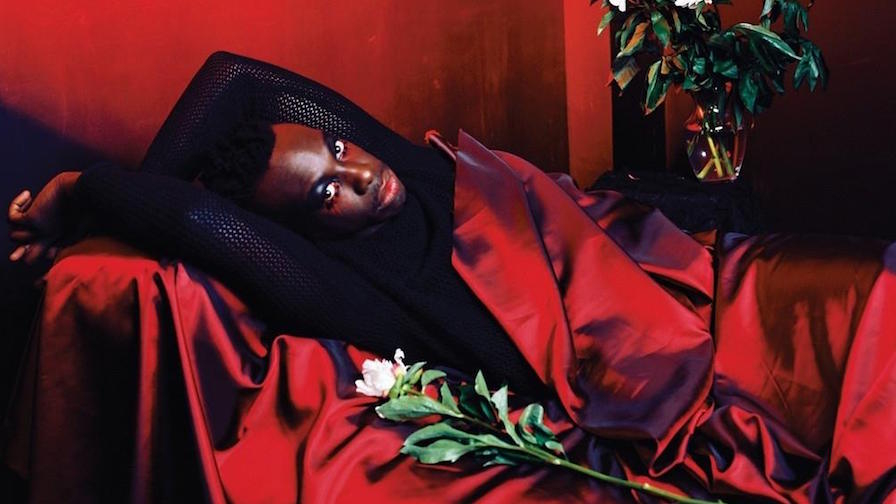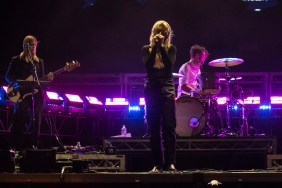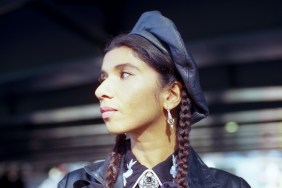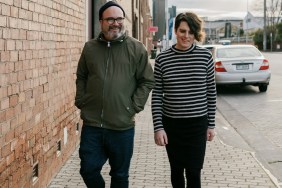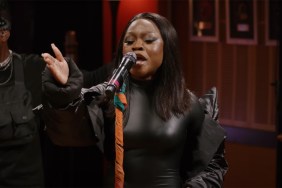Le1f exploded onto the scene in 2014, with Wut and its grimy neon beats and super-super fast wordplay. Khalif Diouf sat sassily on a buffed-up pikachu as his rap wriggled between claps and horns. Upon first inspection, whilst Diouf was undoubtedly a master mouth-smith with an ear for off-the-cuff production, it was not evident that he had anything ‘profound’ or ‘deep’ to offer. But, he powerfully demonstrated in both Dark York and his new album Riot Boi, that he is a proud reveller of the ‘intersection’ – the space between genders, sexes, sexualities and cultures.
Rather than recycle the sweet plastic figurines of popworld, Le1f chose to repurpose and reimagine the ugly mess that is dubbed ‘America’ and perhaps ‘The World’. Amazingly, he did not find himself swamped in the mostly fatuous flotsam that pours from the mouths of misguided demagogues and claptrappers. Like balancing on a rope, Le1f has spoken beautifully and respectfully for those who are both in the middle and at the margins. In the middle, because they find themselves between the binaries, between the ‘truths’ – male/female, black/white etc. At the margins, because those who cannot be numbered and labelled are slid to the back of the shelf.
So Le1f has used his platform to speak for the mixed, the post-gender and the collateral. By doing so, he has become a member of the new artists who are rewriting the narratives of yore – FKA Twigs and Shamir to name an obvious two.
Le1f. Thank you for being deep, cute and an absolute pleasure to speak with.
Music Feeds: I listened intently to Riot Boi. I am really interested in both its lyricism and musicality. I just want to start by asking: What did you aim to do? What was your objective in creating such a dark, political album?
L: I wanted to make music that I wanted. Music that didn’t exist.
MF: In the album, you pull back the veil that hides the under-represented and unrepresented. You talk about the complexity of femininity, transphobia, homophobia, cultural effacement and misandry. You cover so many bases. What in your experience as an artist made you want to address these issues?
L: My experience in life, to be honest. People make love songs about straight relationships and make their blaze-blah music videos everyday. No one would ever ask them, ‘What inspires you to make a love song?’ All they say is ‘I just know.’ In that same way, I wanted to have that level of honest self-expectation; to discuss my experiences. The nature of doing that is pretty jarring. You know…I didn’t make it about something that wasn’t my experience. There is more to life than just partying, having fun and a good time. The same goes for me as a gay man and a black man.
MF: As an example of a powerful song, Umami/Water celebrates the indomitability of trans women – their strength. It really broadens the horizon of sex-identity. I understand that your close friendship with Juliana Huxtable was one of the motivators behind the song. Can you talk about the song in more detail?
L: I really wanted to make a song that celebrated trans people and trans culture. I wanted to make sure that it wasn’t offensive to anyone. You know, I didn’t want to misunderstand the struggle. It takes a lot of words to make a rap song and it wasn’t necessarily my story to tell. But, I have so many close friends that have a trans experience. I just wanted to be super honest – ‘this is how I feel about my awesome trans friends and this is how they inspire me’.
As I was saying, rap songs have a lot of words, so in my effort to be tasteful and respectful, I had to do a bit of research. I had to have conversations and understand what was necessary, what they needed from music as a community. Looking at Juliana’s work, I began to understand the feeling of getting dressed up everyday and being someone who was born in the wrong body in terms of gender.
You know, it’s about trying to live your life as fully as you can. I guess in the case of being male to female that means feeling like the woman you really are. In the slang here in New York, we call that ‘fishyness’, when someone is being super feminine in the gayworld. That is why I equated the song with Umami, fish and water and everything.
MF: Awesome. I was looking at some of Juliana’s artwork that she did for the New Museum Triennial. Frank Benson’s statue of her as a sleeping hermaphroditus, a green metallic goddess, is truly breathtaking. She is at the intersection of so much. So are you though. You mentioned being gay, being black and growing up in New York. You are in a place where culture, sex and sexuality collide. How has all this affected what you have produced?
L: Well, I can imagine being anyone else to be honest. If anything, it has given me a wealth of ambition and passion. All the adversity that I have had to face on so many levels, whether it be the microaggressions that happen in my first-world, privileged life everyday or it be the blatant discouragement, even from people that I feel close to. I think that having that kind of adversity is inspiring. Beyond that, even being from a single parent household with a poor mum and dealing with that class struggle. It is inspiring. It makes you want to get something that you don’t have.
So I feel like the biggest driving force in my career to date is the push of adversity. I don’t really care about fame. I’ll always be out here making crazy, experimental and even more self-satisfying art. That part of me will always want that and do that. That’s why I am not a pop star or anything. It keeps me grounded, humble and ambitious. It keeps me in the struggle.
MF: Riot Boi kind of reminds me of MIA’s, Arular and Dizzy Rascal’s, Boy In Da Corner and other XL alumni. I know that MIA is a massive influence for you and for good reason because she is fucking brilliant. How have your influences – Missy Elliot, Alice Glass, Sleater Kinney, to name a few – contributed to the album?
L: I love MIA. To be honest, I have not listened to a MIA record in a while. But, in my life she has been such an enormous influence. Working with XL recordingss and recording with the label has just been a dream. I wanted to make a true XL record. In my eyes, that means so many things. As an artist, it means ‘Am I Arular the rapper?’, ‘Am I Dizzy rascal’s Showtime?’. I am into production, even though I didn’t to the bulk of the production on the record.
I grew up on The Prodigy, Basement Jaxx and Sigur Ros. So I just wanted it to be the best of all of those things. I wanted it to be the best that I could do. You know, a record that some 16 year old kid is picking up on and now wants to be a musician because they bought it along with Twigs and Shamir. I wanted to honour XL’s and my influences’ high level of artistry.
MF: To get back to the production. You have worked with Lunice, Blood diamonds and Evian Christ on all of your different songs. They mostly have this kind of dark, woozy club atmospheric to them. But, sometimes they are KPOPesque and pastel pink. How did Riot Boi’s sometimes complicated production relate to your politics?
L: When I started, I knew that it was time for me to make a political record. So it meant becoming more open about discussing real issues in my music. I didn’t feel that all the topics in the ‘intersection’ had made it into the actual pop format. So it was time for me to tackle that challenge. Every record has to be some kind of challenge or it is just not fun.
So since listening to Arular, I had a list of all the types of songs I would like to make. That list included everything that was on Dark York and everything that was on this record too. You know, sonically and lyrically it contained everything that my teenage angsty self thought was important in life. Whether it be about being a broke teenager, drinking and smoking cigarettes, stealing things from urban outfitters, or about islamophobia on the subway train, or looking like an african person. But, I don’t know if I trust any 17 year old’s political opinion. So a lot of those things didn’t make it onto the first mixtape.
But over the past few years, I have started to gain the courage to make these statements. While somebody is going to be printing out metal and plastic and selling it for $10, I was going to tackle my fears. And tackling my fears made dark music, from a production perspective.
MF: Yeh. I remember listening to you, Mykki Blanco, Zebra Katz and House of Ladosha. You are all really powerful. How do you feel with the terminology or genre label of ‘queer rap’?
L: I think it is a little too easy. People have to open up their ears and their minds. I guess that it is a cool conversation to talk about people of a certain sexuality making experimental music. But, I mean, you can write a think-piece or label for any little section or identity. I think it creates a grouping that is just clickbait. I don’t remember reading any think pieces about how being a white american…hahaha.
MF: Hahaha. It is a way of turning a minority into a kind of fetish.
L: Right. The more people become cool and accepting of life in general, and all the things that happen in life, the more that artists will be able to come up and out, and do their thing.
MF: Before, you were talking about the previous music you released, like Wut and Boom. It was really different to your current stuff. Can you describe the journey that you went through to become the present ‘you’?
L: It definitely took putting myself into a sad headspace constantly, which was actually very educational. You know, understanding the very deep and systematic issues in our society. It’s not that I didn’t understand them before I just became more invested in them. It was very intimate and often offending. So I am excited to make some happy music now.
MF: Totally, but I still love the way your music is now. So you are coming all the way out to Australia for Sugar Mountain Festival. You have been here before: What was your experience of Australia? How do you feel about us?
L: Before I ever came to Australia, I heard that it was one of the most racist countries in the western world. Look, I get that there are lots of crazy things happening down there. But, it felt like the way America was in the radical 1970s. Maybe there is this older generation with super suppressing ideas, and then a whole bunch of radical millennials that are repainting the social climate and global perception of Australia.
MF: Yeh, you are kind of correct. There is this huge population of nearly-dead, archaic baby boomers. The rest of us are open, safe, free and comfortable. We will totally welcome you.
L: When I flew into the Gold Coast, I had a security guard immediately rip through my stuff. She was like, ‘You’re a rapper right?’, and I thought, ‘You definitely look like a lesbian!’ But, in the country, everything was easy breezy. It was one of the funnest places I have ever been to. I wish I was there multiple times a year.
MF: Hahaha. You will be performing all your new material when you come down. How is all the preparation going?
L: I haven’t done it yet. I haven’t done it at all. It’s all happening now. The tour is starting on 17 January in New Zealand. It’s gonna be a new show for sure.
–
Le1f is in the country at the end of January, grab the dates and ticket links below!
Le1f 2016 Australian Tour
Thursday, 21st January
Oxford Art Factory – Sydney
Tickets: Handsome Tours
Friday, 22nd January
TBC Club, Brisbane
Tickets: Handsome Tours
Saturday, 23rd January
Sugar Mountain Festival
Victoria College Of The Arts + Arts Precint, Melbourne
Tickets: Sugar Mountain Festival
Sunday, 24th January
Jack Rabbit Slims, Perth
Tickets: Handsome Tours
